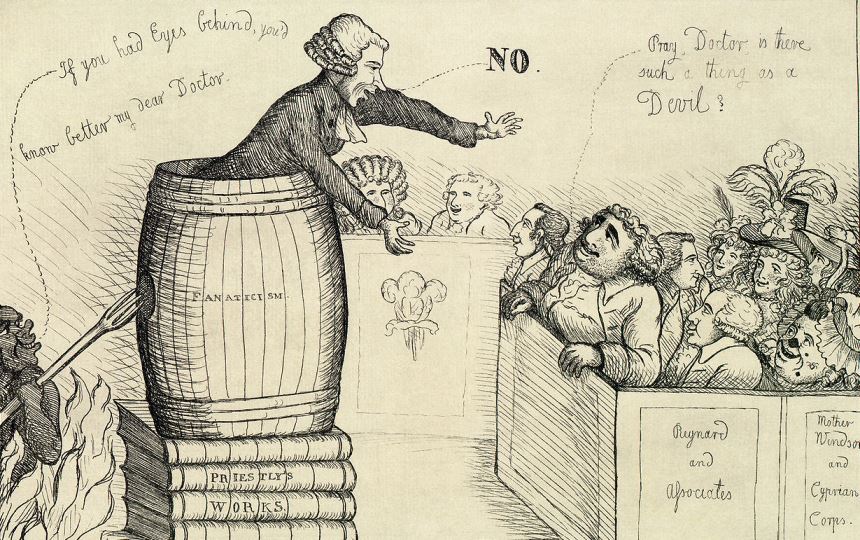|
In reading Gregg Frazer’s book on the founders, his high estimate of Joseph Priestley’s influence on the founding fathers is clear and blatant. Early in the book, Frazer writes that “It would be difficult to overstate the importance of Priestley to the development of the political theology of the American Founding.” In speaking of John Adams in particular, Frazer writes that he was “heavily influenced” by Priestley. Frazer further insists: That Jefferson and Adams considered Priestley the authority in religious matters can be seen in Adams’s repeatedly expressed desire to have Priestley answer difficult questions. Adams asserted that "no M[an] was more capable” of answering them, and after Priestley’s death, he bemoaned the fact that the minister was no longer alive to do so. According to Frazer, this supposed influence of Priestley explains what John Adams’ meant when he spoke of the corruptions of Christianity – a subject about which Priestley had written a book that Adams had subsequently read. Frazer admits that Adams never specifically identified what he meant by corruptions, but then he writes of Adams: Given that he was influenced by Joseph Priestley, that he expressed accord with Jefferson, and that he used the term corruptions routinely and without clarification in correspondence with Jefferson, one may safely assume that he meant what they did by the use of the term Unfortunately for Frazer, this supposedly significant influence of Priestley on Adams simply doesn’t exist. I was recently challenged by Jonathan Rowe of the American Creation Blog to count how many times Adams mentioned Priestley in his letters. Rowe claimed that the sheer number of times that Adams mentioned Priestley proved Frazer to be correct. I decided to take Rowe’s challenge one step further and create a collection of every reference that Adams made to Priestley which could then be used to analyze Adams’ opinion of his friend’s ideas and determine whether Adams really was as strongly influenced by Priestley as Frazer claimed. I found a total of 92 references to Priestly within the letters of John Adams, and the collection of all those references fills 31 pages of text. Having read many of these references already, I fully expected my study to vindicate my objection to Frazer’s claim, but I was pleasantly surprised to find that Adams himself had provided his own summary of his views on Priestley. In a letter to his son, John Quincy, Adams wrote of Priestley that: His Judgment Reasoning and Eloquence are not always to be envied: but his Industry, Research, and compilations may be as usefull as they are admirable. In other words, Adams appreciated the historical facts which Priestley brought to light, but he had little use for the conclusions which Priestly presented about those facts. You can read the entire list of 92 references in the document below, and when you do, I think that you’ll agree with me that this passing comment from Adams to his son is completely accurate. The vast majority of Adams’ comments regarding Priestly were either non-committal or negative. His few positive comments were mostly related to Priestley’s bare knowledge of historical facts as opposed to his reasoning and conclusions. And, far from being “the authority in religious matters,” Adams frequently included Priestley in his lists of ignorant philosophers and theologians. Here is the list so that you can see for yourself exactly what Adams thought of Joseph Priestley:
0 Comments
Your comment will be posted after it is approved.
Leave a Reply. |
Bill Fortenberry is a Christian philosopher and historian in Birmingham, AL. Bill's work has been cited in several legal journals, and he has appeared as a guest on shows including The Dr. Gina Show, The Michael Hart Show, and Real Science Radio.
Contact Us if you would like to schedule Bill to speak to your church, group, or club. "Give instruction to a wise man, and he will be yet wiser: teach a just man, and he will increase in learning." (Proverbs 9:9)
Search
Topics
All
Archives
June 2024
|
||||||



 RSS Feed
RSS Feed